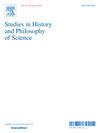学科认同与统一社会科学理念:英国学术界调查
IF 1.8
2区 哲学
Q1 HISTORY & PHILOSOPHY OF SCIENCE
引用次数: 0
摘要
在社会科学是否由一套基本的认识论和方法论原则所统一的问题上,哲学界存在着很大的分歧,这与关于科学的统一性和不统一性的更广泛的争论如出一辙。这个问题不仅关系到哲学家,也关系到社会科学家本身。社会科学家形成了关于社会科学统一性或不统一性的信念,这些信念很可能会影响他们的研究实践,比如他们对专业领域的选择以及是否开展跨学科项目。为了评估这种观念,文章介绍了对 1188 名在社会科学部门工作的英国学者进行调查的结果。调查显示,经济学、社会学和政治学等核心学科的研究人员更倾向于认同自己是社会科学家,而历史学和心理学等边缘学科的研究人员则不太认同社会科学家这一类别。尽管跨学科性得到广泛支持,但研究结果表明,各学科之间存在深刻的认识论分歧,而且更接近人文学科而非自然科学。本文章由计算机程序翻译,如有差异,请以英文原文为准。
Disciplinary identity and the idea of a unified social science: A survey of British academics
There is substantial philosophical disagreement over whether the social sciences are united by a set of fundamental epistemic and methodological principles, echoing broader debates about the unity and disunity of science more generally. This question does not merely concern philosophers but also social scientists themselves. Social scientists form beliefs about the unity or disunity of the social sciences which likely influence their research practices, such as their choices of specialty areas and whether they pursue interdisciplinary projects. To assess such beliefs, the article presents the results of a survey of 1188 British academics working in social science departments. It shows that researchers in core disciplines like economics, sociology, and political science are more likely to identify as social scientists, while those in peripheral fields such as history and psychology are less attached to the category. Despite widespread support for interdisciplinarity, results reveal deep epistemological divergences across disciplines and a greater proximity to the humanities rather than the natural sciences.
求助全文
通过发布文献求助,成功后即可免费获取论文全文。
去求助
来源期刊

Studies in History and Philosophy of Science
管理科学-科学史与科学哲学
CiteScore
2.50
自引率
10.00%
发文量
166
审稿时长
6.6 weeks
期刊介绍:
Studies in History and Philosophy of Science is devoted to the integrated study of the history, philosophy and sociology of the sciences. The editors encourage contributions both in the long-established areas of the history of the sciences and the philosophy of the sciences and in the topical areas of historiography of the sciences, the sciences in relation to gender, culture and society and the sciences in relation to arts. The Journal is international in scope and content and publishes papers from a wide range of countries and cultural traditions.
 求助内容:
求助内容: 应助结果提醒方式:
应助结果提醒方式:


